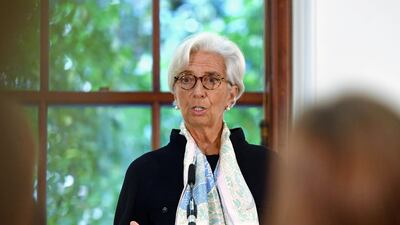Growth, borrowing and the currency will all be hit if the UK fails to agree a negotiated settlement to leave the European Union, the International Monetary Fund said on Monday.
The IMF found that every Brexit scenario would be worse for Britain than its current position among the 28 members of the world’s largest trading bloc, said IMF Managing Director Christine Lagarde.
But the IMF concluded that a no-deal scenario would result in the worst consequences for Britain, including “reduced growth, increased deficit, depreciation of the currency and… a reduction in the size of the UK economy”, she said.
The report claimed that new UK trade agreements with countries outside the EU could eventually pare some of these losses, but would be unlikely to offset the costs of the leaving the bloc.
“Compared with today's smooth single market, all the likely Brexit scenarios will have costs for the UK economy,” she said in London, announcing the conclusions of the IMF's annual assessment. Ms Lagarde said the EU would be affected to a “lesser extent”.
_________
Read more
No-deal Brexit means interest rate rises, says Bank of England chief
Gina Miller Eyes Political Future in Campaign to Stop Brexit
London mayor backs second Brexit vote
_________
She warned that time was running out to secure anything other than the worst-case scenario envisaged by the IMF. With about six months to go before Britain’s formal exit from the EU, the IMF said there were many unresolved issues, including the Irish border and the future economic relationship between Britain and the EU.
“The range of issues that remains to be addressed is daunting, and the time left to accomplish them may be very short,” Ms Lagarde said.
“This is not some abstract matter. Many of these issues relate to people’s everyday lives, like the ability to travel to Europe, and being able to count on secure access to critical medications produced on the continent.”
Mrs Lagarde reminded negotiators that the larger the impediments to trade in any potential deal, the costlier the results would be. “This should be fairly obvious, but it seems that sometimes it is not,” she chided.
If a broad Brexit deal was agreed, the IMF predicted Britain’s economy will grow by 1.5 per cent in 2018 and 2019.
The IMF backed a 21-month implementation period to prepare for the changes and to iron out problems.
British Chancellor Philip Hammond – seen as one of the staunchest anti-Brexit advocates within the Cabinet – said that he agreed with the IMF’s findings, and pointed to the difficulties of recovering from the 2008 financial crash.
“The IMF are clear today that no deal would be extremely costly for the UK as it would also for the EU, and that despite the contingency actions we're taking, leaving without a deal would put at risk the substantial progress the British people have made over the past 10 years in repairing our economy,” he said.


